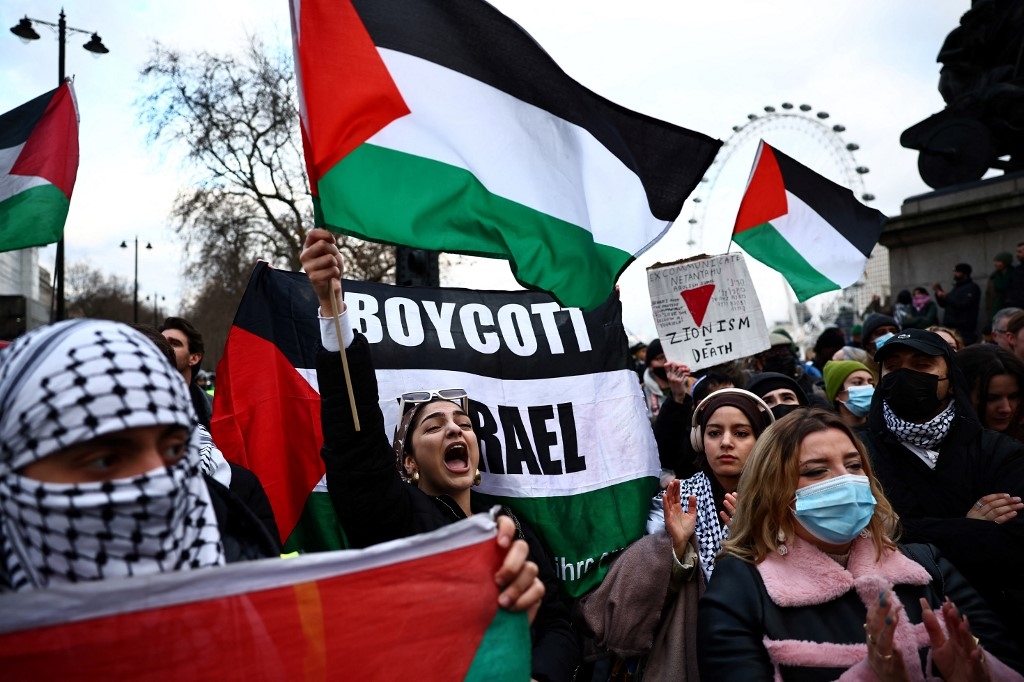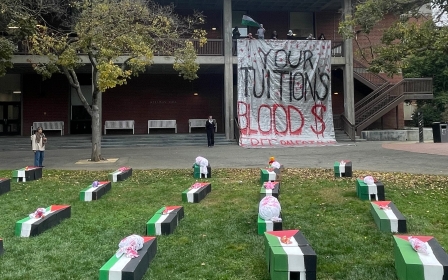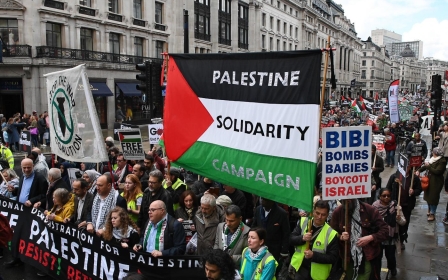Palestine campaigners and rights groups relieved as UK anti-BDS bill shelved due to election

Pro-Palestine and rights campaigners in the UK have welcomed the shelving of a bill that would ban local authorities from instituting boycotts of Israel, as a result of the calling of the general election.
Numerous pieces of legislation that were set to go through parliament will now not progress after UK Prime Minister Rishi Sunak called a surprise general election on Wednesday.
Among those is a bill that was aimed at cracking down on the Boycott, Divestments and Sanctions (BDS) movement which aims to put pressure on Israel over its violations of international law and repression of the Palestinians.
According to the government, the bill was set to prevent public bodies when making decisions about procurement and investment from "considering a country or territory of origin or other territorial considerations in a way that indicates political or moral disapproval of a foreign state".
Polls suggest that the Labour Party, which has voiced opposition to the bill, is likely to win the election on 4 July.
New MEE newsletter: Jerusalem Dispatch
Sign up to get the latest insights and analysis on Israel-Palestine, alongside Turkey Unpacked and other MEE newsletters
Advocacy group Liberty said the shelving of the bill was welcome news for civil liberties.
“The proposed bill would have given central Government powers to override local democracy and risked stopping people from exercising their right to freedom of expression," said Charlie Whelton, Policy and Campaigns Officer at Liberty, speaking to Middle East Eye.
"The bill risked putting the UK Government on a collision course with its international human rights obligations."
He added that he hoped the next government would not seek to revive these proposals "or anything similar, which would curb our right to protest and set an extremely dangerous precedent, with a harmful and wide-reaching impact”.
The Palestine Solidarity Campaign also welcomed the news, saying it was a victory for their campaigns against the bill.
"The defeat of the anti-boycott bill, which sought to shield Israel from democratic criticism over human rights abuses and violations of international law, is a major win for BDS campaigners," the group said in a statement.
"There is huge and growing pressure for public bodies, universities, and other institutions to cut financial ties with those who are complicit in Israel’s war crimes, genocidal violence, and other crimes against humanity."
The Conservative government, which has been in power since 2010 (initially as part of a coalition), has generally taken a staunchly pro-Israel line in foreign affairs.
Since the war in Gaza began on 7 October, the government has repeatedly criticised pro-Palestinian demonstrations and has proposed legislation to restrict them.
The Labour Party, led by Keir Starmer, has also been accused of being overly supportive of Israel's actions in Gaza by pro-Palestinian campaigners.
Labour losing ground with Muslims
Middle East Eye reported this week that senior UK Labour MPs in constituencies with high Muslim populations could lose their seats due to the party's stance on Israel's war on Gaza, according to a new report.
Citing Labour insiders, the Daily Mail reported that several opposition lawmakers were at risk in the upcoming general election, which Prime Minister Rishi Sunak announced would take place on 4 July.
In several areas with large Muslim populations, pro-Palestinian independent candidates are running to challenge incumbent Labour politicians.
That includes British-Palestinian activist Leanne Mohamad standing against shadow health secretary Wes Streeting in Ilford North, and former South African MP Andrew Feinstein standing against Labour leader Keir Starmer in Holborn and St Pancras.
"Wes [Streeting], Shabana [Mahmood], Rushanara [Ali], Jess [Phillips] and others will have real fights on their hands," a senior Labour insider told the Daily Mail, listing Labour MPs with a sizeable proportion of Muslim constituents.
"Independents showed they can make gains in the locals which will bolster their campaigns and also give wavering voters a bit of a nudge towards them."
An analysis published last week found that Labour lost a third of its vote share in areas with a Muslim majority during recent local elections.
Middle East Eye delivers independent and unrivalled coverage and analysis of the Middle East, North Africa and beyond. To learn more about republishing this content and the associated fees, please fill out this form. More about MEE can be found here.




